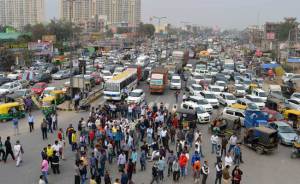Signs of rural distress for a dominant community?
 Why suddenly the flare-up in Haryana? Demand for reservation in jobs and education for the dominant caste of the Jats is not new or sudden either. Why now, after the BJP government seemed settled to attend to development in the context of new opportunities? The widespread agitation led to much violence and loss of lives and also extensive damage to public and private property. The crucial geography of the agitation also indicates the lifelines of national highways and the water supplies to the national capital, New Delhi.
Why suddenly the flare-up in Haryana? Demand for reservation in jobs and education for the dominant caste of the Jats is not new or sudden either. Why now, after the BJP government seemed settled to attend to development in the context of new opportunities? The widespread agitation led to much violence and loss of lives and also extensive damage to public and private property. The crucial geography of the agitation also indicates the lifelines of national highways and the water supplies to the national capital, New Delhi.
Within days of the agitation spreading we saw how the vital services can be disrupted and no less than the chief of the army staff met the defence minister and other high officials got into a huddle and no less surprising how soon the state government, no less even the Centre capitulated to the agitator’s demands.
The centre agreed to set up a committee to examine the demands, why, even the state government agreed to introduce a legislation to grant Other Backward Class status to the Jats!
As we write the agitation seems to have been halted, we can’t say whether the agitation was formally called off. What was evident in the 11 days of agitation, destruction of property, the trains, trucks and the water supply canal cut off, were indications that the anger of the agitators had many components.
It was purely the anger of a dominant caste, long accustomed to enjoy unrestricted privileges and perks. Politically, the Jats were the real sources of power, the Jat Chief Minister of Haryana, as we have seen all these years were almost the powers behind the Central government of the Congress party and it is only now the BJP tried to upset the balance of power and succeeded in setting up its own chosen person from a non-Jats caste. So, this attempt on the part of the BJP to upset the established practice found an outlet in the form or under the garb of an excuse for demanding OBC status?
There is some truth o think so. Also, as it is pointed out by media and other sources that given their dominant position in the local community and also at the state and national level politics, why this sudden eruption?
Why a dominant community demands for quota?
It is pointed out that as in the case of Gujarat where the dominant community there in Gujarat, namely, the Patidars, popularly called Patels, also demanded quota, as now demanded in Haryana, is there any underlying theme in this new awakening in the dominant communities? One is naturally tempted to ask so.
Yes, this demand is owing to such a long-term, even large-scale sociological changes that are changing the rural countryside.
As in Gujrat we also saw in Andhra Pradesh to the land-owning dominant Kapu caste saw an agitation by its charismatic leader for the very same job quota.
The changing rural scene is marked by dwindling land ownership, thanks to ceiling laws or the unviability of farming or some other reasons and the once dominant rural households are reduced to relative deprivation and the rise of the lower classes and castes in the rural hierarchy is also causing heartburn in the old families.
A range of sociological changes, from the disappearance of the older holds of the upper and dominant castes over the lower castes, the increasing political patronage, the vote-bank politics as in TN, for instance, where the political of freebies had reached to ridiculous limits.
There is a new awareness among the older castes and families over the rise of more and more irresponsible political leadership across the many new parties.
So, there is this sudden eruption of unrest among the dominant castes. Landownership is no more a stable indicator of leadership in the rural areas.
Also, castes have come back to determine one’s local standing. The auto show rooms in Rohtak belong to the Jats were left out of the fury of the masses!
So, these are times for intellectuals and even policy makers to think about how to go about building a new social harmony in the rural areas without playing the populist politics or even to ideological politics of the BJP kind.